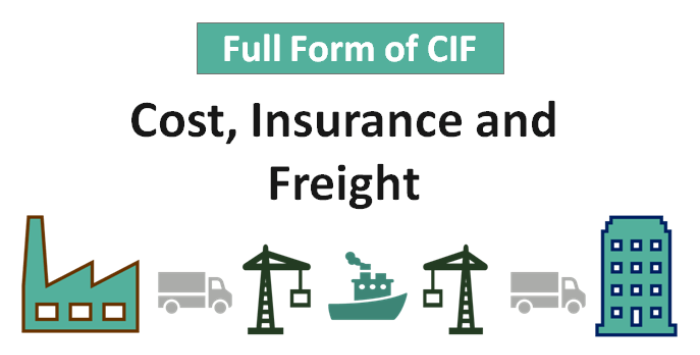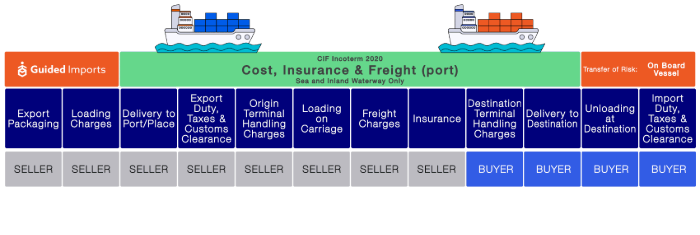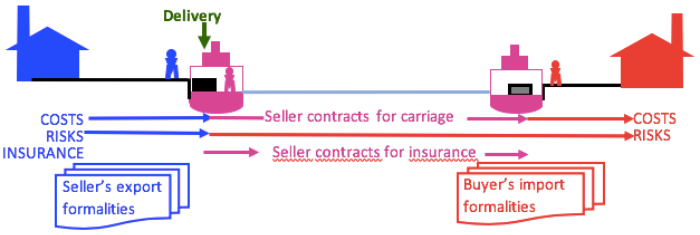It’s essential to know which shipping terms are best for you when buying in international trade. And if it’s your first time importing goods from overseas, CIF is one of the incoterms that can make your international purchase more convenient.
With over ten years of experience in using all the trade terms in the trade market, we’ll guide you in whether or not CIF is the best fit for your orders. This article compiled all the necessary information you need to know about CIF.
Let’s begin your international purchase journey!

What is CIF incoterms?
CIF means Costs, Insurance, and Freight. It is part of the international shipping agreements for inland waterway transportation. In a CIF contract, the seller is responsible for paying freight charges, shipping insurance policy, and further additional fees that come along with those. Unlike some incoterms published by the international chamber, in CIF, the risk and cost responsibilities transfer at different shipment points.
When to use CIF incoterms?
Buyers should use CIF when they have a delivery through inland waterways for bulk cargo, oversized goods, or even small parcels. CIF agreements are among the international commerce terms, one of the most convenient shipping terms for inexperienced buyers.
The buyer doesn’t get many responsibilities in CIF.
The seller assumes responsibility for export licenses, customs clearance, and minimum insurance coverage. Sellers can accept CIF incoterms when they won’t don’t mind paying for the cost of the delivery and insurance costs but don’t want them to shoulder the risk of shipment.
What are the Buyers and Sellers’ Responsibilities with CIF incoterms?

Seller’s Responsibilities:
- Export licenses and customs duty: The sellers finance the export licenses and other documents needed until the cargo arrives at the port of destination.
- Loading costs: The seller pays for the loading charges at the named port.
- Carriage and insurance paid: The seller finances the minimum insurance coverage and the main carriage used in the delivery transport.
- Export packaging: It is the seller’s responsibility to make sure that the packaging of the goods passes the minimum standards.
- Costs of waterway shipments: In CIF, the seller delivers to and pays for the freight forwarder to have direct access.
Buyer’s Responsibilities:
- Unloading charges: Buyers finance the costs of unloading the bulk cargo from the shipping vessel.
- Transport to delivery site: Once the shipped cargo arrives at the destination port, the buyer assumes responsibility for the carriage costs of transporting the cargo further.
- Custom taxes duties for imports: Buyers are responsible for the import duties and documentation needed.
- Risks: The buyer shoulders the risks of the cargo from the shipping port until the port of destination and onwards.
A Fast , Easy and Cheap Way to Ship from China
Do not hesitate to contact Leeline Sourcing at any time regarding your shipments from China.
Pros and Cons of CIF incoterms
Advantages:
Here are the advantages of choosing the Cost, Insurance and Freight incoterm for buyers:
- One of my GREAT EXPERIENCE with CIF terms is the EASY TRADE. I already have the freight cost and insurance discussed. Shipping occurs without any trouble.
- CIF terms make the delivery of hazardous goods easier for buyers. The seller is responsible for the documentation in their country. Even if complicated forms need to be filled out, the seller is responsible for them.
- CIF incoterms are forgiving to beginners. The import process in CIF is not as complex compared to the EWX or FOB agreement. The seller delivers the cargo until the port of destination, so the buyer won’t be paying for additional charges even if there are delays or penalties in the shipment process.
Disadvantages:
Here are the disadvantages of choosing the Cost, Insurance, and Freight.
- CIF is not the most cost-effective shipment term. As the seller is responsible for most costs, they can also choose to charge the buyer more. Some sellers lie and state that the expenses for the carriage used and shipping freight forwarders are higher than they are. The seller tricks the buyer into paying more for the cargo.
- CIF applies only to sea and inland waterway transport. This is a disadvantage as you can’t use your knowledge in CIF in other modes of transportation in the future.
- The buyer gets little control. In CIF, the seller gets more control than the buyer.
- The seller is only expected to pay the minimum insurance coverage. When damages occur, your insurance might only cover a portion of all your already paid expenses.
- The buyer shoulders the risks early. The seller finances the costs until the final destination. But, the risk of the goods transfers to the buyer from the moment the ship leaves the port.
CIF incoterms Risks

For the seller: The risk of additional costs of carriage.
In CIF for inland waterway transport, the seller is responsible for paying the carriage and freight costs. So, when there’s a sudden increase in the market costs during transit, the seller bears the additional financial burden.
It has happened to me a BUNCH of times. It occurs in BUSY SEASONS or holidays when there are no freight forwarders available. Prices went up. And I had to PAY twice.
For the buyer: The risk of external damage or the deterioration of goods.
According to CIF shipment terms, the buyer is responsible for the risk associated with the shipment of the goods from the shipping port until the port of destination. So, when the goods are somehow damaged during freight, the buyer bears all the responsibility. So, buyers must be willing to risk their money in choosing CIF.
CIF incoterms Example
Scenario 1:
An onion farmer delivers fifteen crates of onions to a nearby country using CIF. CIF doesn’t apply to air freight transportation. He can only choose sea freight forwarders. Using the cost, insurance, and freight, CIF must finance the insurance of these carrots and pay for the loading and freight charges.
Scenario 2:
During the freight transport, delays unfortunately occurred. The onions arrive at the destination port in lousy condition. Although the farmer paid for the transport charges, the farmer is not responsible for transport risks. So, he is not accountable for refunding the goods to the buyer.
FAQs about CIF
Who Pays CIF Freight?
The seller pays for the CIF freight from the shipping port to the shipment destination. The buyer pays a fixed price to the seller, and the seller handles the costs and documents required to deliver the cargo to the shipment destination.
Does CIF Include Duty?
CIF includes the export duties and taxes on the seller’s country. But, the buyer must still organize and finance the duties and customs taxes in the port of destination.
What does CIF stand for in Shipping Terms?
CIF stands for Cost, Insurance, and Freight. As the name suggests, those three are the primary responsibilities of the seller in CIF.
Can CIF Incoterms be used for small parcel shipments?
Yes, buyers can use CIF for small parcel shipments. Many buyers opt for CIF in small batches of parcels. The insurance for small packages could cost buyers more to process the insurance themselves.
What’s Next
In CIF, the seller is responsible for most costs and documents. Buyers get less paperwork and don’t have to worry about contacting carriers and freight forwarders. But, this does not necessarily mean that CIF is the best incoterm for every client. Remember, the seller transfers the risk to the buyer way before the responsibility of costs for the goods transfers.
LEELINE SOURCING is well-versed in the incoterm rules of all trade terms. If you need expert cost and freight guidance for your orders from China, contact us and talk with one of our representatives.








